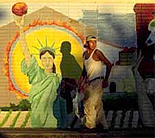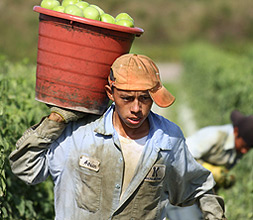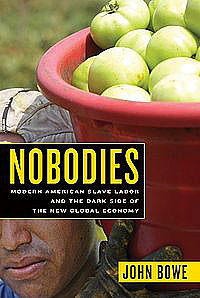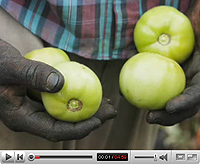 The CIW's Anti-Slavery Campaign is a worker-based approach
to eliminating modern-day slavery in the agricultural
industry. The CIW helps fight this crime by uncovering,
investigating, and assisting in the federal prosecution
of slavery rings preying on hundreds of farmworkers.
In such situations, captive workers are held
against their will by their employers through threats
and, all too often, the actual use of violence -- including
beatings, shootings, and pistol-whippings. The CIW's Anti-Slavery Campaign is a worker-based approach
to eliminating modern-day slavery in the agricultural
industry. The CIW helps fight this crime by uncovering,
investigating, and assisting in the federal prosecution
of slavery rings preying on hundreds of farmworkers.
In such situations, captive workers are held
against their will by their employers through threats
and, all too often, the actual use of violence -- including
beatings, shootings, and pistol-whippings.
In the most recent case to be brought to court, a federal grand jury indicted six people in Immokalee on January 17th, 2008, for their part in what US Attorney Doug Molloy called "slavery, plain and simple" (Ft. Myers News-Press, “Group accused of keeping, beating, stealing from Immokalee laborers,” 1/18/08). The employers were charged with beating workers who were unwilling to work or who attempted to leave their employ picking tomatoes, holding their workers in debt, and chaining and locking workers inside u-haul trucks as punishment ("How about a side order of human rights," Miami Herald, 12/16/07).
That case became the seventh such farm labor operation to be prosecuted for servitude in Florida -- involving well over 1,000 workers and more than a dozen employers -- in the past decade. Here below is a list of the other six cases, in chronological order:
U.S. vs. Ronald Evans -- In 2007, Florida employer Ron Evans was sentenced to 30 years in federal prison on drug conspiracy, financial re-structuring, and witness tampering charges, among others. Jequita Evans was also sentenced to 20 years, and Ron Evans Jr. to 10 years. Operating in Florida and North Carolina, Ron Evans recruited homeless U.S. citizens from shelters across the Southeast, including New Orleans, Tampa, and Miami, with promises of good jobs and housing. At Palatka, FL and Newton Grove, NC area labor camps, the Evans' deducted rent, food, crack cocaine and alcohol from workers' pay, holding them "perpetually indebted" in what the DOJ called "a form of servitude morally and legally reprehensible." The Palatka labor camp was surrounded by a chain link fence topped with barbed wire, with a No Trespassing sign. The CIW and a Miami-based homeless outreach organization (Touching Miami with Love) began the investigation and reported the case to federal authorities in 2003. In Florida, Ron Evans worked for grower Frank Johns. Johns was 2004 Chairman of the Florida Fruit and Vegetable Association, the powerful lobbying arm of the Florida agricultural industry. As of 2007, he remained the Chairman of the FFVA's Budget and Finance Committee.
U.S. vs. Ramos - In 2004, Ramiro and Juan Ramos were sentenced to 15 years each in federal prison on slavery and firearms charges, and the forfeiture of over $3 million in assets. The men, who had a workforce of over 700 farmworkers in the citrus groves of Florida, as well as the fields of North Carolina, threatened workers with death if they were to try to leave, and pistol-whipped and assaulted -- at gunpoint -- passenger van service drivers who gave rides to farmworkers leaving the area. The case was brought to trial by the DOJ after two years of investigation by the CIW. The Ramoses harvested for Consolidated Citrus and Lykes Brothers, among others.
U.S. vs. Lee - In 2001, Michael Lee was sentenced to 4 years in federal prison and 3 years supervised release on a slavery conspiracy charge. He pled guilty to using crack cocaine, threats, and violence to enslave his workers. Lee held his workers in forced labor, recruiting homeless U.S. citizens for his operation, creating a "company store" debt through loans for rent, food, cigarettes, and cocaine. He abducted and beat one of his workers to prevent him from leaving his employ. Lee harvested for orange growers in the Fort Pierce, FL area.
U.S. vs. Tecum - In 2001, Jose Tecum was sentenced to 9 years in federal prison on slavery and kidnapping charges. He forced a young woman to work against her will both in the tomato fields around Immokalee, and in his home. The CIW assisted the DOJ with the prosecution, including victim and witness assistance.
U.S. vs. Cuello -- In 1999, Abel Cuello was sentenced to 33 months in federal prison on slavery charges. He had held more than 30 tomato pickers in two trailers in the isolated swampland west of Immokalee, keeping them under constant watch. Three workers escaped the camp, only to have their boss track them down a few weeks later. The employer ran one of them down with his car, stating that he owned them. The workers sought help from the CIW and the police, and the CIW worked with the DOJ on the ensuing investigation. Cuello worked for Manley Farms North Inc., a major Bonita Springs tomato supplier. Once out of prison, Cuello supplied labor to Ag-Mart Farms, a tomato company operating in Florida and North Carolina.
U.S. vs. Flores -- In 1997, Miguel Flores and Sebastian Gomez were sentenced to 15 years each in federal prison on slavery, extortion, and firearms charges, amongst others. Flores and Gomez had a workforce of over 400 men and women in Florida and South Carolina, harvesting vegetables and citrus. The workers, mostly indigenous Mexicans and Guatemalans, were forced to work 10-12 hour days, 6 days per week, for as little as $20 per week, under the watch of armed guards. Those who attempted escape were assaulted, pistol-whipped, and even shot. The case was brought to federal authorities after five years of investigation by escaped workers and CIW members.
The Anti-Slavery Campaign has resulted in freedom
for more than a thousand tomato and orange pickers held
in debt bondage, historic sentences for various agricultural
employers, the development of a successful model of
community-government cooperation, and the growth of
an expanding base of aware and committed worker activists.
The CIW employs a  unique
combination of outreach, investigation, and worker-to-worker
counseling in order to combat already-existing slavery
operations case-by-case. unique
combination of outreach, investigation, and worker-to-worker
counseling in order to combat already-existing slavery
operations case-by-case.
At the same time, the CIW believes
that the ultimate solution to modern-day slavery in
agribusiness lies on the "demand side" of
the US produce market -- the major food-buying corporations
that profit from the artificially-low cost of US produce
picked by workers in sweatshop and, in the worst cases,
slavery conditions. Ultimately, those modern mega corporations
must leverage their vast resources and market influence
as major produce buyers to clean up slavery and other
labor abuses in their supply chains once and for all.
Both aspects of the Anti-Slavery Campaign -- the day-to-day
investigative efforts and the longer-term work to eliminate
the market conditions that allow modern-day slavery
to flourish -- operate on the common principle that
the most effective weapon against forced labor is an
aware worker community engaged in the defense of its
own labor rights.
The CIW is a founding member of the national Freedom
Network USA to Empower Victims of Slavery and Trafficking.
As a regional coordinator for the Freedom Network Training
Institute on Human Trafficking, we train state and federal
law enforcement and social services personnel throughout
the Southeastern US on how to recognize and assist enslaved
people. The CIW's efforts have gained national recognition,
including the National Organization for Women (NOW)
'Woman of Courage Award,' given to a CIW member in 2000. Most recently, the CIW was presented with the 2007 Anti-Slavery Award by Anti-Slavery International in London.
Reports on the CIW's efforts also appear in the following
studies:
“Human Traffic, Human Rights: Redefining Victim
Protection,” Anti-Slavery International/London,
2002
“Hidden Slaves: Forced Labor in the United States,”
Free the Slaves and Human Rights Center, Berkeley,
2004
|
 |
 A GLIMPSE INSIDE
A GLIMPSE INSIDE
THE SWEATSHOPS!
A four-minute reflection on the hands that pick tomatoes for the fast-food industry and the
inhumane conditions so prevalent today in Florida's fields.

Slavery in the news...
Click on the link below for more on the widely-praised new book by John Bowe, including an in-depth look at the CIW's approach to fighting modern-day slavery, "Nobodies: Modern American Slave Labor and the Dark Side of the New Global Economy"
* "Slaves to Profit," Review of "Nobodies" in Forbes Magazine, 12/07
* “Group accused of keeping, beating, stealing from Immokalee laborers,” Ft. Myers News-Presss, 1/08
 * CIW wins 2007 Anti-Slavery International Award in London!... See a report from the award ceremony here * CIW wins 2007 Anti-Slavery International Award in London!... See a report from the award ceremony here
* "Coalition honored for war on slavery," Ft. Myers News Press, 11/07
* "Labor camps keep workers in servitude with crack cocaine," Naples Daily News, 9/06
* "Nobodies:
Does slavery exist in America?," New Yorker,
4/03
 * "21st Century Slaves," National Geographic, 10/03 * "21st Century Slaves," National Geographic, 10/03
* "Modern-day Slavery: Still Harvesting Shame," Multi-part special report, Palm Beach Post, 12/03
* "Fear
and knowing in Immokalee," St. Petersburg Times,12/02
* "Florida
employers guilty of slavery," Labor Note 8/02
* "Trafficking
for labour," BBC World News radio report
* "For
pickers, slavery tastes like tomatoes," Op/Ed
Palm Beach Post 3/03
* "Report:
Modern-day slavery alive and well in Florida," CNN 2/04
* "Slavery? In Florida? In 2003? Yes," Palm Beach Post
Op/Ed 11/03
* "Esclavitud
en el siglo XXI," Univision (reporte de internet con Jorge Ramos), Enero 2004

Modern-day
slavery is a violation of the 13th Amendment.
When the CIW uses the word slavery, we do not mean
“slave-like” or “resembling slavery"
--- rather, we are referring to conditions that
meet the high standard of proof and definition of
slavery under US federal laws.
 The cases we have helped bring to justice have been
prosecuted by the US Department of Justice Civil
Rights Division either under laws forbidding peonage
and indentured servitude passed just after the Civil
War during Reconstruction (18 U.S.C. Sections 1581-9)
or under the 2000 Victims of Trafficking and Violence
Protection Act, which prohibits the recruitment,
harboring, transportation, provision, or obtaining
of a person for labor or services, through the use
of force, fraud, or coercion for the purpose of
subjection to involuntary servitude, peonage, debt
bondage, or slavery. The cases we have helped bring to justice have been
prosecuted by the US Department of Justice Civil
Rights Division either under laws forbidding peonage
and indentured servitude passed just after the Civil
War during Reconstruction (18 U.S.C. Sections 1581-9)
or under the 2000 Victims of Trafficking and Violence
Protection Act, which prohibits the recruitment,
harboring, transportation, provision, or obtaining
of a person for labor or services, through the use
of force, fraud, or coercion for the purpose of
subjection to involuntary servitude, peonage, debt
bondage, or slavery.
|


 A GLIMPSE INSIDE
A GLIMPSE INSIDE 

 unique
combination of outreach, investigation, and worker-to-worker
counseling in order to combat already-existing slavery
operations case-by-case.
unique
combination of outreach, investigation, and worker-to-worker
counseling in order to combat already-existing slavery
operations case-by-case. 
 * CIW wins 2007 Anti-Slavery International Award in London!...
* CIW wins 2007 Anti-Slavery International Award in London!...  *
*  The cases we have helped bring to justice have been
prosecuted by the US Department of Justice Civil
Rights Division either under laws forbidding peonage
and indentured servitude passed just after the Civil
War during Reconstruction (18 U.S.C. Sections 1581-9)
or under the 2000 Victims of Trafficking and Violence
Protection Act, which prohibits the recruitment,
harboring, transportation, provision, or obtaining
of a person for labor or services, through the use
of force, fraud, or coercion for the purpose of
subjection to involuntary servitude, peonage, debt
bondage, or slavery.
The cases we have helped bring to justice have been
prosecuted by the US Department of Justice Civil
Rights Division either under laws forbidding peonage
and indentured servitude passed just after the Civil
War during Reconstruction (18 U.S.C. Sections 1581-9)
or under the 2000 Victims of Trafficking and Violence
Protection Act, which prohibits the recruitment,
harboring, transportation, provision, or obtaining
of a person for labor or services, through the use
of force, fraud, or coercion for the purpose of
subjection to involuntary servitude, peonage, debt
bondage, or slavery.